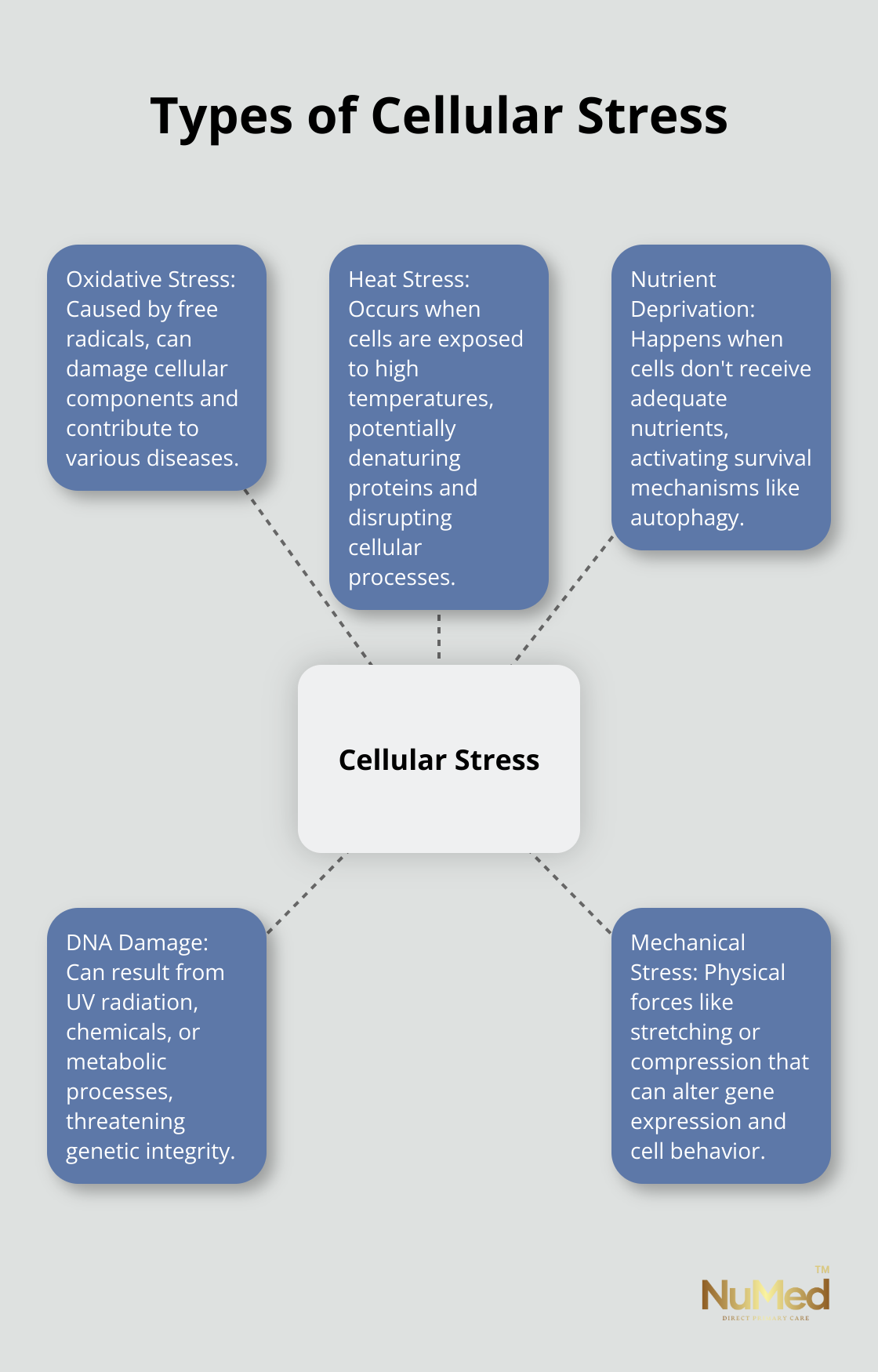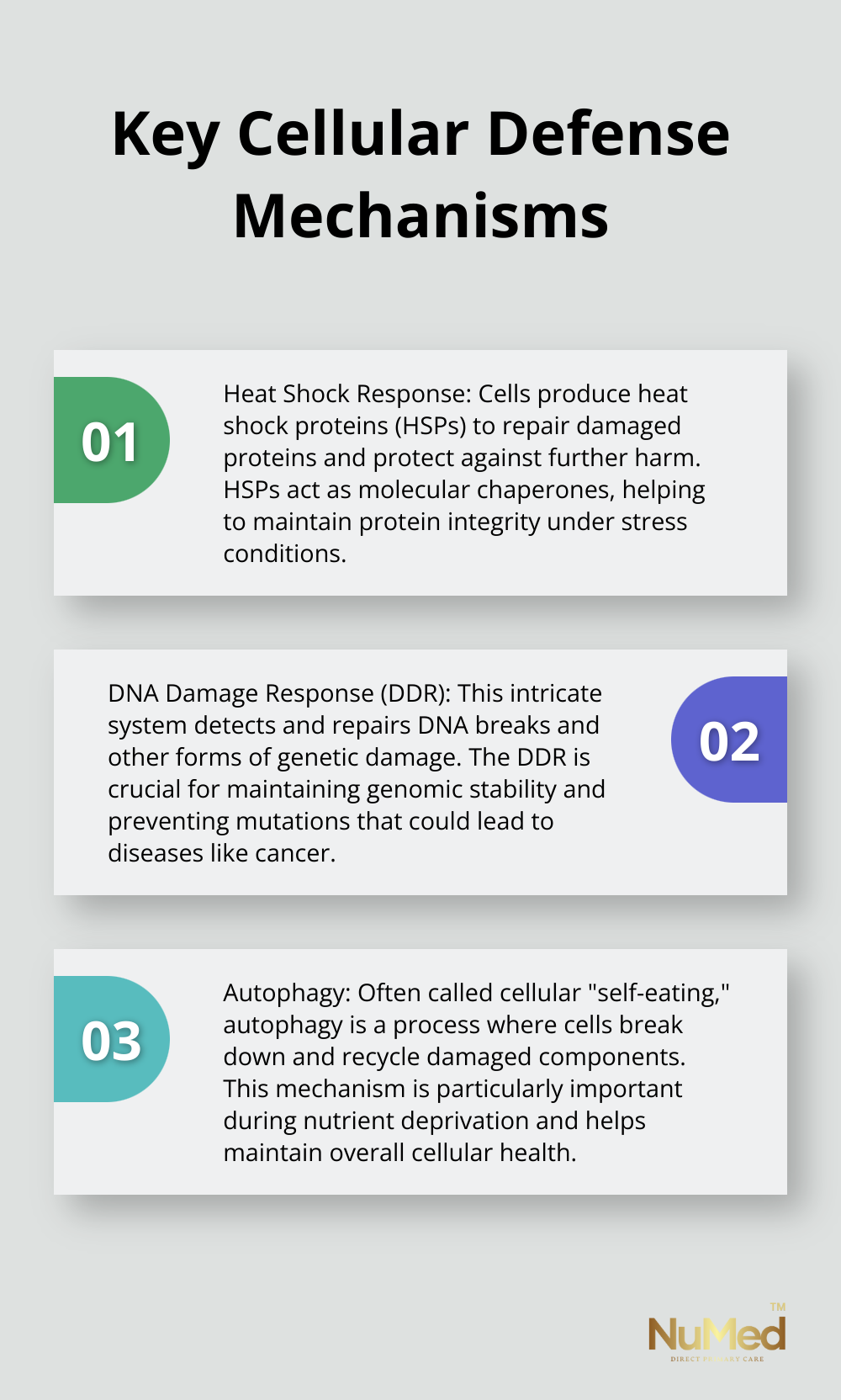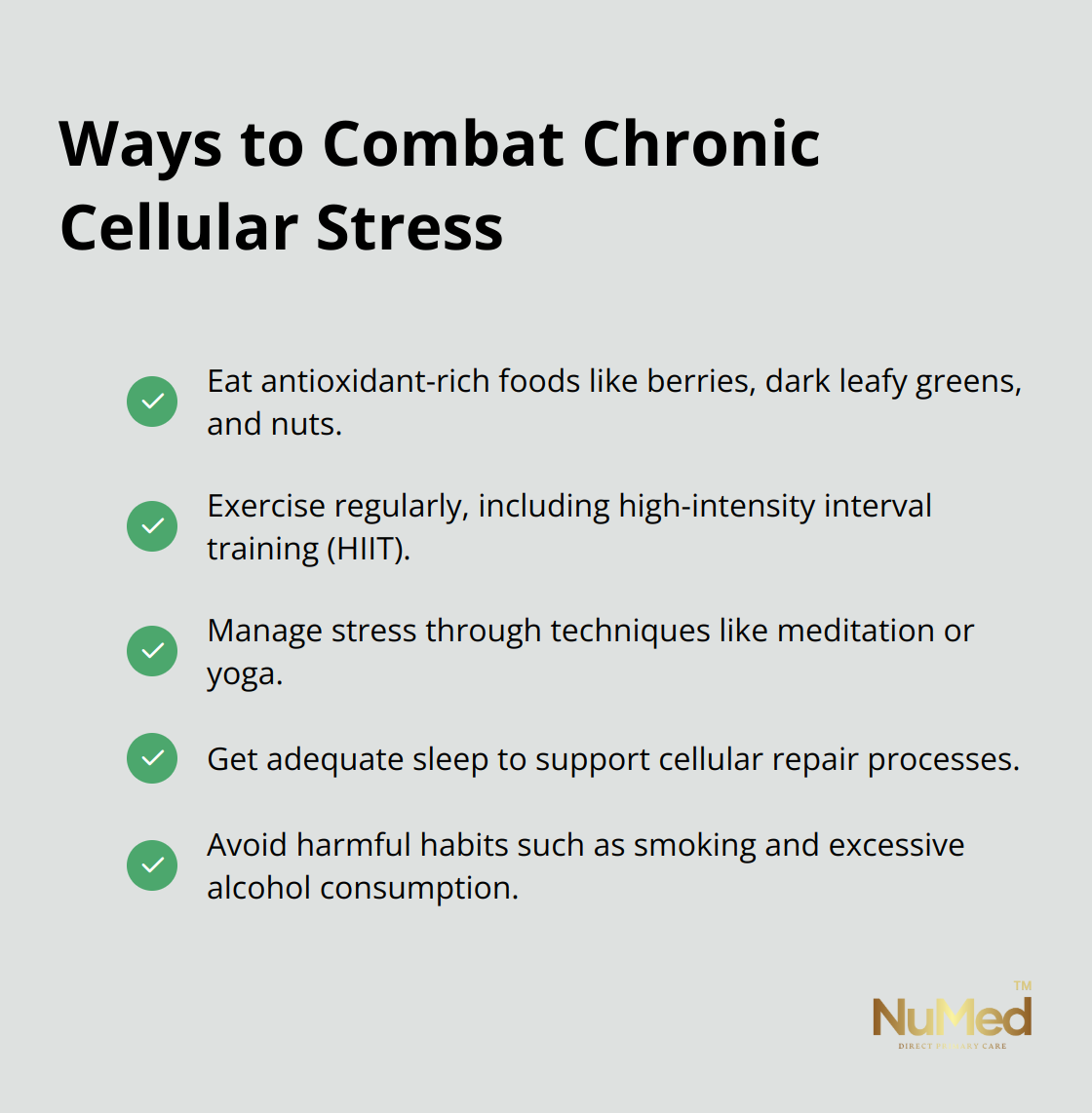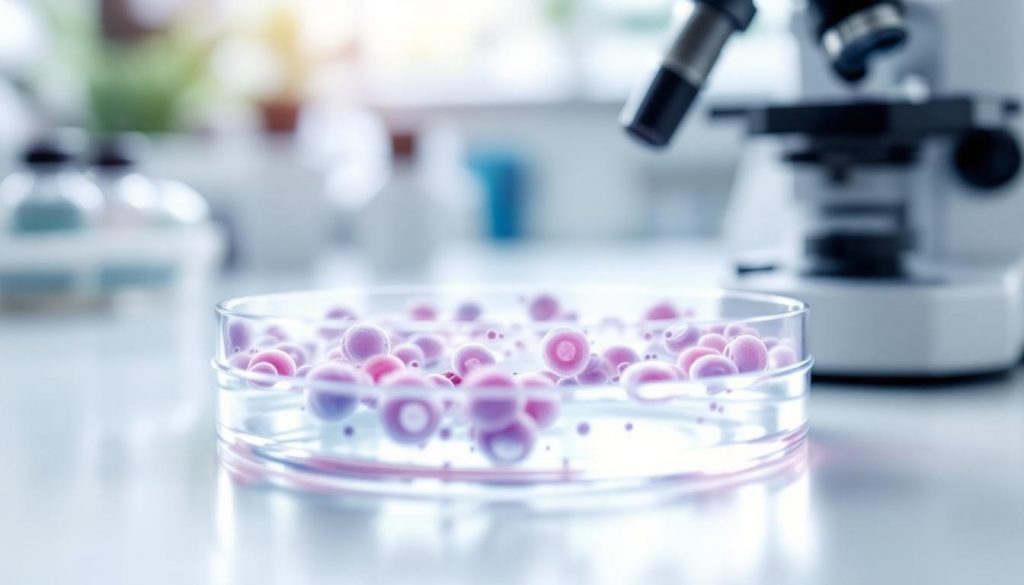At NuMed DPC, we’re fascinated by the intricate ways our cells respond to stress. These microscopic powerhouses face numerous challenges daily, from oxidative damage to nutrient shortages.
Understanding cell response to stress is key to unlocking insights into aging, disease prevention, and overall health. In this post, we’ll explore the types of cellular stress, how cells defend themselves, and the long-term health impacts of chronic stress at the cellular level.
What Stresses Our Cells?
Our cells face a barrage of stressors daily, each with the potential to disrupt normal function and trigger protective responses. Let’s explore the main types of stress our cells encounter.

The Oxygen Paradox
Oxidative stress causes cellular damage across multiple systems, contributing to neurodegeneration (Alzheimer’s, Parkinson’s, Huntington’s), cancer progression, and other conditions. While oxygen is essential for life, it can also damage cells through oxidation.
To combat this, eat a diet rich in antioxidants. Berries, dark leafy greens, and nuts are excellent choices. Regular exercise also boosts your body’s natural antioxidant defenses.
When Temperatures Rise
Heat stress happens when cells are exposed to temperatures above their normal range. This can denature proteins and disrupt cellular processes. Research shows that heat stress can trigger a protective response called the heat shock response, which helps cells adapt to higher temperatures. HSP regulates programmed cell death by eliminating stress responses to degrade.
Stay hydrated and avoid prolonged exposure to extreme heat to protect your cells. If you exercise in hot conditions, take frequent breaks and monitor your body temperature.
The Hunger Games at the Cellular Level
Nutrient deprivation occurs when cells don’t receive adequate nutrients to function properly. This can happen during fasting, malnutrition, or certain medical conditions. A study in Nature Cell Biology revealed that nutrient-deprived cells activate autophagy (a process that recycles cellular components for energy).
Ensure a balanced diet with adequate protein, healthy fats, and complex carbohydrates. If you practice intermittent fasting, do so under medical supervision to avoid prolonged nutrient deprivation.
Genetic Integrity Under Attack
DNA damage can result from various factors, including UV radiation, certain chemicals, and even normal metabolic processes. The journal Nature Reviews Molecular Cell Biology reports that cells have sophisticated mechanisms to detect and repair DNA damage, but chronic exposure can overwhelm these systems.
Protect your DNA by wearing sunscreen, avoiding tobacco, and limiting alcohol consumption. Certain foods (like broccoli and garlic) contain compounds that may enhance DNA repair processes.
The Physical Toll on Cells
Mechanical stress affects cells through physical forces like stretching, compression, or shear stress. This is particularly relevant for cells in organs like the heart or bones. Research in the Journal of Cell Science shows that mechanical stress can alter gene expression and cell behavior.
Regular, moderate exercise can help cells adapt to mechanical stress. However, avoid overtraining, which can lead to excessive cellular damage.
Understanding these stressors provides valuable insights into maintaining cellular health. Now, let’s examine how our cells respond to these various forms of stress and the mechanisms they employ to protect themselves.
How Cells Defend Against Stress
The Cellular Stress Arsenal
Cells have evolved a sophisticated set of mechanisms to combat various stressors. These responses are critical for maintaining cellular health and preventing long-term damage.

The heat shock response plays a key role in this defense. When cells encounter high temperatures or other stressors, they rapidly produce heat shock proteins (HSPs). These molecular chaperones help repair damaged proteins and protect against further harm. The increased expression of HSP70 has been suggested to play a role in the cellular response to thermal stress in dairy cows, protecting proteins against damage.
The unfolded protein response (UPR) activates when the endoplasmic reticulum becomes overwhelmed with misfolded proteins. The UPR slows down protein production, increases the cell’s capacity to fold proteins correctly, and eliminates severely damaged proteins.
DNA: The Guardian of Our Genetic Code
Cells employ the DNA damage response (DDR) to protect our genetic material. This intricate system detects and repairs DNA breaks and other forms of damage. Recent studies suggest that inhibition of the BER pathway can enhance the efficacy of immunotherapy.
To support your cells’ DNA repair mechanisms, incorporate foods rich in antioxidants and omega-3 fatty acids into your diet. Blueberries, spinach, and fatty fish (like salmon) are excellent choices. Additionally, regular moderate exercise enhances DNA repair processes.
Cellular Housekeeping and Self-Destruction
Autophagy, often called cellular “self-eating,” is a critical process for maintaining cellular health. During autophagy, cells break down and recycle damaged components. This process is particularly important during nutrient deprivation.
In cases of severe stress or damage, cells may opt for a controlled self-destruction process called apoptosis. While it might seem counterintuitive, apoptosis is crucial for overall tissue health, removing damaged cells before they can cause harm.
Supporting Cellular Defense Mechanisms
The importance of supporting these cellular defense mechanisms through lifestyle choices cannot be overstated. A balanced diet, regular exercise, stress management, and adequate sleep all play vital roles in maintaining cellular health.
Try to include a variety of colorful fruits and vegetables in your diet to provide a wide range of antioxidants. Engage in moderate exercise for at least 150 minutes per week to boost your body’s natural defense systems. Practice stress-reduction techniques like meditation or deep breathing exercises to help mitigate the effects of chronic stress on your cells.
As we explore the impact of chronic cellular stress on health in the next section, we’ll see how these defense mechanisms can become overwhelmed, leading to various health issues.
The Hidden Toll of Chronic Cellular Stress
Chronic cellular stress can devastate our bodies, leading to a cascade of health issues that extend far beyond the microscopic level. This chapter explores the long-term impacts of prolonged cellular stress on overall health and well-being.
The Aging Accelerator
Chronic stress at the cellular level speeds up the aging process. A study published in the journal Cell Metabolism found that oxidative stress can shorten telomeres (the protective caps at the end of our chromosomes). Shorter telomeres associated with accelerated aging and increased risk of age-related diseases.
To combat this, eat antioxidant-rich foods like berries, dark leafy greens, and nuts. Regular exercise, particularly high-intensity interval training (HIIT), boosts telomerase activity, the enzyme responsible for maintaining telomere length.
The Inflammation Connection
Chronic cellular stress fuels systemic inflammation, a key driver of numerous health problems. Research in the Journal of Allergy and Clinical Immunology reveals that oxidative stress activates inflammatory pathways, leading to the release of pro-inflammatory cytokines.
To reduce inflammation, eat omega-3 fatty acids through fatty fish or supplements. Curcumin, found in turmeric, acts as another powerful anti-inflammatory compound. Try 500-1000mg of curcumin daily, but consult with a healthcare provider before starting any new supplement regimen.
From Cells to Serious Conditions
The long-term effects of chronic cellular stress extend to major health conditions. Cardiovascular disease, neurodegenerative disorders, and cancer all link to prolonged cellular stress.
A study in the New England Journal of Medicine found that chronic inflammation (often triggered by cellular stress) increases the risk of cardiovascular events. To protect your heart, maintain a healthy weight, engage in regular physical activity, and manage stress through techniques like meditation or yoga.
For brain health, research in Neurobiology of Aging suggests that cellular stress contributes to the accumulation of misfolded proteins, a hallmark of neurodegenerative diseases like Alzheimer’s. Cognitive activities, social engagement, and a Mediterranean-style diet rich in olive oil and fish may help protect against these conditions.
Regarding cancer, the journal Nature Reviews Cancer highlights how chronic cellular stress can lead to DNA damage and genomic instability, potentially initiating tumor formation. While we can’t eliminate all cancer risk, a healthy lifestyle, avoiding tobacco, limiting alcohol, and regular cancer screenings play vital roles in prevention.

Final Thoughts
Cell response to stress impacts overall health profoundly. Scientists explore how to harness natural stress response mechanisms to combat diseases like cancer and neurodegenerative disorders. Personalized medicine approaches that consider individual variations in cellular stress responses could revolutionize treatment strategies.
A holistic approach to health supports the body’s natural defense mechanisms. We at NuMed Direct Primary Care focus on preventing illness by addressing root causes and fostering personalized connections between patients and practitioners. Our services include extensive lab work and functional medicine to promote optimal cellular health.
Research in this field continues to progress rapidly. New strategies emerge to help patients achieve and maintain vibrant health at the cellular level and beyond. Every action we take influences our cellular well-being, from dietary choices to exercise habits.
















